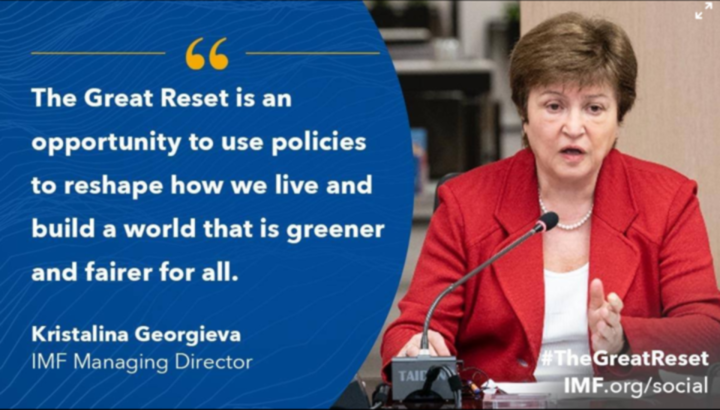The "Great Reset" is dismissed by the public as a conspiracy
theory. But it is not. It is a global agenda driven by the World Economic
Forum. Cüneyt Yilmaz, 7/5/2021 German original
Cüneyt Yilmaz, 7/5/2021 German original
Accusations are emerging in various media that the "Great Reset" initiative is a conspiracy narrative that contradicts reality. But on June 3, 2020, the World Economic Forum (WEF) had issued a press release titled "The Great Reset: A Unique Twin Summit at the Start of 2021."
The World Economic Forum's release can be read here
Klaus Schwab, the World Economic Forum and the IMF
WEF founder Klaus Schwab and Thierry Malleret, who serves as senior director of the WEF's Global Risk Network, have published a book titled "Covid-19: The Great Reset" about six months after the start of the 2020 Corona pandemic. The release date of the book is July 9, 2020.
In their book, they write, among other things:
"Because of the high degree of interdependence and interconnectedness of today's economies, industries, and businesses, comparable to the dynamics with which macro categories are interconnected, each link in the chain can quickly trigger a domino effect on the others in a wide variety of ways. Let's look at restaurants as an example. This industry was hit by the pandemic on such a dramatic scale that it is not even certain how the restaurant industry will ever fully recover. One restaurant operator put it this way: 'Like hundreds of other chefs in the city and thousands across the country, I now face the big question of what our restaurants, our careers, our lives might look like if we ever get them back at all.' In France and the United Kingdom, several industry experts estimate that up to 75 percent of independent restaurants may not survive the lockdowns and subsequent social distancing. Surviving, on the other hand, will be the large chains and fast-food giants. This suggests that large companies will get bigger while the smallest shrink or disappear altogether."
"Micro-upheaval will force every company in every industry to try new ways of doing business and operating. Those who give in to the temptation to return to the old way of working will fail. All those, on the other hand, who adapt with flexibility and imagination will eventually use the Covid 19 crisis to their advantage."
"The reduction in soc. contacts in response to Corona and the physical standoff measures imposed during the curfew will also help e-commerce emerge as an increasingly strong industry trend. Consumers need products, and if they can't shop, they will inevitably move to buying them online. And then it becomes a habit. People who have never shopped online before will become friends with it, while casual online shoppers will now move to it more and more. That became clear during the lockdown."
"As Henry Kissinger noted: 'The cohesion and economic success of countries is based on the belief that their institutions can anticipate disasters, stop their effects, and restore stability.' When the Covid 19 pandemic is over, the institutions of many countries will be branded as failures.' This is especially true for some rich countries with state-of-the-art health systems and sophisticated research, science, and innovation, whose citizens will wonder why their country's public sector performed so poorly compared to others. In these countries, the very fabric of their social fabric and socioeconomic system may come out and be denounced as the 'real' culprit that has failed to provide economic and social well-being for the majority of citizens."
IMF chief Kristalina Georgieva, at the end of a memo on the "Great Reset," states, "Let me conclude with an example from the past. William Beveridge, in the midst of World War II, submitted his famous report in 1942 projecting how Britain should address what he called the 'five giant evils.' That famous 'Beveridge Report' led to a better country after the war - including the creation of the National Health Service, which saves so many lives in Britain today. It was also at this time that my institution, the IMF, was founded - at the Bretton Woods Conference. So now is the time to turn the page - and use all the power we have. In the case of the IMF, we have a financial capacity of a trillion dollars and a huge political commitment. This is the moment to decide that history will look back on this as a 'Great Reset' and not a 'Great Reversal.' And I want to say - loud and clear - that the best memorial we can build for those who lost their lives in the pandemic is to create a world that is greener, smarter and more just."
Speaking at the Chicago Global Council on Global Affairs, World Economic Forum (WEF) founder Klaus Schwab said the fourth industrial revolution will "lead to a merging of our physical, digital and biological identities" as part of the "Great Reset." In his book "Shaping the Future of the Fourth Industrial Revolution," he writes that implantable microchips, for example, could be used to read people's minds.
"As capabilities in this area (crime fighting, ed.) improve, the
temptation for law enforcement and courts to use techniques to determine the
likelihood of criminal activity, assess guilt, or possibly even retrieve
memories directly from people's brains will increase. Even crossing a national
border could one day require a detailed brain scan to assess a person's
security risk. Indeed, some of us already feel that our smartphones have become
an extension of ourselves. Today's external devices - from wearable computers
to virtual reality headsets - are almost certainly implanted in our bodies and
brains," Schwab writes.
Society in Germany is deeply divided
The "Great Reset" initiative is intended to transform economies and
societies. It is wrong to engage in a rhetorical abuse of this initiative to
achieve short-term day-to-day political goals. Since the World Economic Forum
has ideally created the "Great Reset" initiative, a public discussion
must take place to avoid false assumptions and conclusions. Employer and
employee associations, various industry associations and citizens must be
allowed to participate in this discussion. This is the only way to build
consensus. Problems and approaches to solving the problems of our time must be
allowed to be articulated. Criticisms must be allowed. It is to be hoped that a
public discussion will be allowed in relation to this initiative. At the
moment, many people find themselves in a situation characterized by a
deep-rooted fear of the future. This condition is aggravated by the
disintegration of family ties, from which no one is spared.
Many people long for the conditions of the Federal Republic before the turn
of the century. This is understandable. An empathetic approach on the part of
policymakers and decision-makers is therefore sorely needed. People finally
need voices that encourage them without presenting them with a political,
ethnic, religious or sexual minority as a scapegoat - and without blaming them.
It is also time not to corner the majority society by the inflationary
accusation of racism, but to involve people in a benevolent way in the fight
against misanthropy of any kind.
Once again, people need voices from high politics to encourage them so that they can look to the future with confidence. Across all continents, this requires human empathy on the part of the elites.
But this also means for each of us not to brand our neighbours, friends or
colleagues as "conspiracy theorists" or "traitors to the
fatherland."
The elites should refrain from intentionally or negligently driving parts of the population to white heat. Society is so divided that by now even unbridgeable walls have been created within the kinship of every citizen.
It is ENOUGH!



Aucun commentaire:
Enregistrer un commentaire